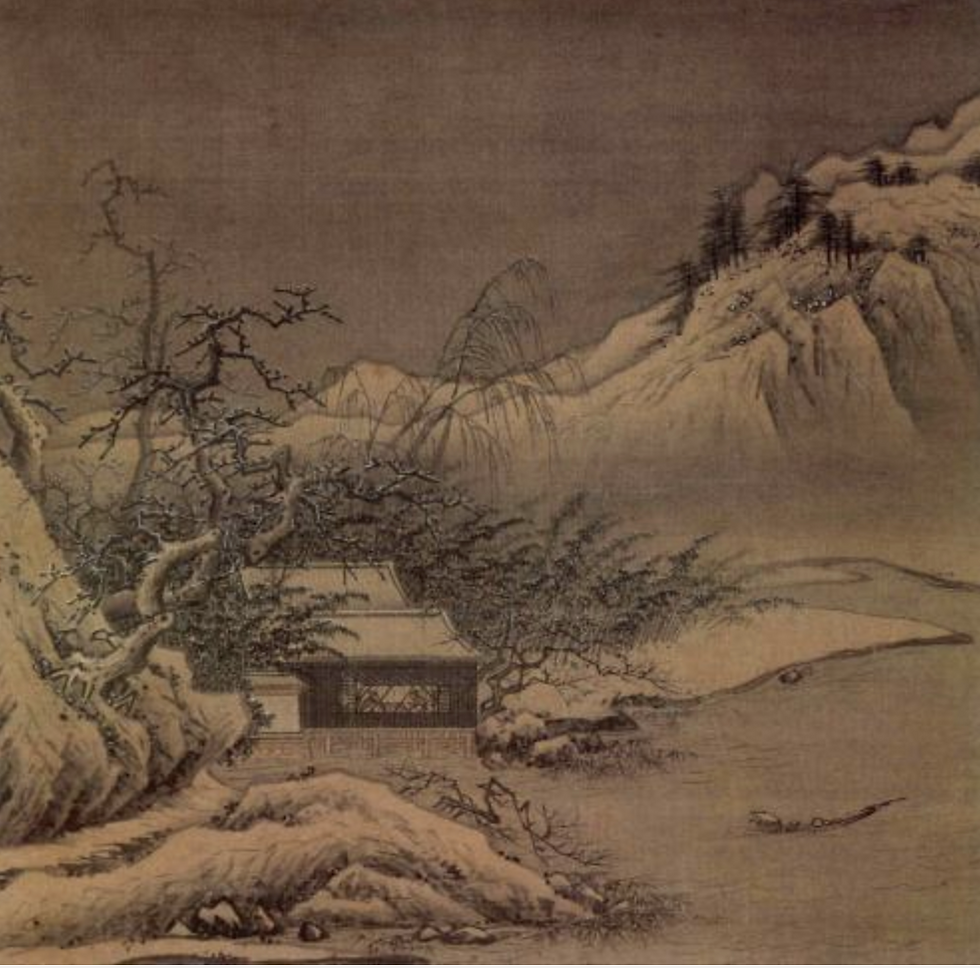江城子·梦中了了醉中醒 I see my previous life in Yuanming
- Julia Min
- Aug 12, 2025
- 3 min read
Updated: Aug 21, 2025
I see my previous life in Yuanming
--to the tune of Jiangchengzi
(Tao Yuanming, visited the Tilted Valley on the fifth day of the Chinese New Year. He found a beautiful spot by a stream, enjoying the view of Mt. Zencheng among hills and pavilions. He wrote 'The Tilted Valley,' making it a popular tourist spot. In 1082, I lived a simple farm life at Dongpo (East Slope). My home, the Snow Hall, was near a creek flowing from the west to the north hill, then south toward hills and pavilions. This place reminds me of the Tilted Valley, inspiring me to compose this poem to the tune of Jiangchengzi.)
written by Su Shi (11th AC, social name 'Dongpo')
En. trans. by Julia Min (Aug. 2025)
I see my previous life in Yuanming,
Oft in dreams and in tipsy thinking.
In vain we spent many a life span,
Rising with fame yet back to the land.
The East Slope, blessed with rain last night,
Wakes to a clear day with Spring magpies.
A hidden creek murmurs by Snow Hall,
Winding from the west towards Mt. North,
Then down to the south, to Mt. Zencheng
That stands proud with hills and pavilions.
It looks just like Yuanming’s Tilted Vale,
So here I came, and here I will stay.

For Appreciation
Su Shi’s unique attitude toward adversity is truly one-of-a-kind, setting him apart as a remarkable figure in Chinese literature and history. His ability to survive the tumultuous waters of life with grace and resilience is a testament to his noble and unwavering spirit. Known for being a hard nut to crack, Su Shi consistently maintained a tolerable and robust attitude, an impressive strength to shake off personal struggles with a remarkable ease that many would envy. He approached life’s challenges with the poise of a saint, adapting to circumstances with an enviable skill that allowed him to thrive even in the most trying of times.
This poem paints a vivid picture of his farm life in Dongpo, where he embraced a self-reliant lifestyle that stood in stark contrast to the chaotic political landscape surrounding him. Indifferent to worldly troubles that ensnared many of his contemporaries, he found joy and contentment even in the face of exile—a situation that, while painful, provided him with the opportunity to reflect and grow. How delightful this must have been for his political foes, who could not fathom how someone they sought to undermine could find such peace and happiness in adversity!
As the years progressed, the weight of aging began to settle upon him, yet he remained astutely aware of his circumstances and surroundings. This awareness was not merely a passive observation; it was a strategic preservation of his energy and talents for future opportunities that would inevitably arise. His keen insight into the shifting tides of political favor allowed him to maintain hope and resilience, preparing himself for the moment when he could re-enter the fray of Court life. Indeed, soon enough, with a change in emperors, Su Shi found himself back in the Royal Court, where his wisdom and experience were once again sought after. What a life he led—a tapestry woven with threads of struggle, triumph, and an indomitable spirit that continues to inspire countless individuals today!
江城子·梦中了了醉中醒
(陶渊明以正月五日游斜川,临流班坐,顾瞻南阜,爱曾城之独秀,乃作斜川诗,至今使人想见其处。元丰壬戌之春,余躬耕于东坡,筑雪堂居之,南挹四望亭之后丘,西控北山之微泉,慨然而叹,此亦斜川之游也。乃作长短句,以《江城子》歌之。)
原作: 苏轼(字子瞻, 号东坡居士; 11世纪北宋)
英译及赏析: 闵晓红(2025年8月)
梦中了了醉中醒,
只渊明,是前生。
走遍人间,
依旧却躬耕。
昨夜东坡春雨足,
乌鹊喜,报新晴。
雪堂西畔暗泉鸣,
北山倾,小溪横。
南望亭丘,
孤秀耸曾城。
都是斜川当日景,
吾老矣,寄余龄。。
Reference:
picture from https://collection.sina.cn/yejie



Comments